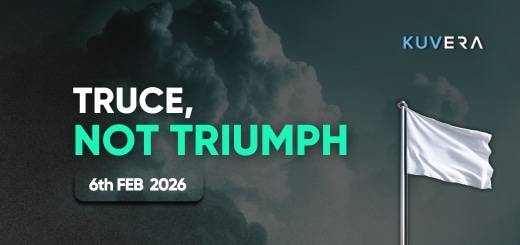In this edition, we talk about the ‘reciprocal tariffs’ that US President Donald Trump has imposed on all countries and how it could affect the global economy. We also talk about Haldiram’s getting new investors on board, BlackRock CEO’s advice on asset allocation, and the RBI’s latest measures to boost banking system liquidity.
Welcome to Kuvera’s weekly digest on the most critical developments related to business, finance, and the markets.
tl;dr Hear the article in brief instead?

“Maverick, it’s not your flying, it’s your attitude,” Lieutenant Tom ‘Iceman’ Kazansky told Lieutenant Pete ‘Maverick’ Mitchell after a practice mission. “The enemy’s dangerous, but right now you’re worse. Dangerous and foolish.”
The year was 1986 and Iceman and Maverick were young, cocky, 20-something navy pilots flying the state-of-the-art F-14A Tomcat fighter jets aboard the USS Enterprise aircraft carrier.
If you still haven’t guessed it yet, we are talking about the original Top Gun movie that went on to become a cult classic and established Tom ‘Maverick’ Cruise and Val ‘Iceman’ Kilmer, who died this week after a long battle with cancer.
But we aren’t really talking about a movie. After all, this is a newsletter that tracks the world of business and economics.
So, what are we really talking about? Well, imagine Donald Trump as Tom Cruise in that movie. Okay, we know, it is difficult. But try for once. Now, how many adjectives that Iceman used to describe Maverick do you think fit Trump, too?
We are being harsh, some of you might say. And maybe we are being so. But what Trump did this week is actually being described in similar terms across the world. Here’s a quick recap of what he did.
The US President announced what he called “reciprocal tariffs” on all of America’s trading partners. All goods imported into the US from any country now carry a 10% baseline tariff and additional tariffs ranging from 10% to 50%.
Trump slapped a 20% tariff on the European Union, 24% on Japan, 25% on South Korea, 34% on China, 26% on India, 32% on Taiwan, 36% on Thailand and 46% on Vietnam. These tariffs are in addition to the ones he levied previously since taking office in January. But some goods, such as semiconductors and pharmaceuticals, are exempt, at least for now.
Essentially, Trump overturned nearly a century-old global trading system that is widely believed to have boosted economic growth worldwide and may have even helped maintain a fragile peace after the two world wars.
Trump and his administration believe that the sweeping tariffs will prompt both American and non-American companies to set up or expand their manufacturing capacities in the US, force its trading partners to cut their tariffs on American goods and import more from the US, and reduce the country’s $1.2 trillion trade deficit.
If things work out the way he wants, that may well happen. If only things were so simple.
As expected, the reaction from America’s trading partners was swift and strong. Canada, which was exempted from reciprocal tariff but was hit by some other blanket tariffs, fired the first shot. Canadian PM Mark Carney announced 25% tariffs on US auto imports and promised more steps. China, which has the biggest trade surplus with the US, called it “typical bullying” and vowed to take countermeasures. Ursula von der Leyen, head of the EU’s executive arm, said that this was “a major blow” to the world economy and that the EU will respond.
Economists and analysts also expressed shock at the higher-than-expected tariffs and worried about their impact on inflation, growth and jobs, not just in the US but also in all other countries. One market strategist told CNN it was the “policymaking equivalent of a suicide bomber”. The Economist said the “mindless tariffs will cause economic havoc”.
Indeed, almost everything in the US will get costlier, from toys, shoes and clothes to cars and Apple iPhones. Recession fears have mounted and US stocks plunged by the most in five years on Thursday, with the tech-heavy Nasdaq sinking 6%. Stock markets across Europe and Asia, slumped as well. Crude oil, dollar and gold declined, too.
How will it affect India? It’s a bit early to say definitively, but sectors such as gems and jewellery and auto components will be hurt while pharma companies will breathe a sigh of relief for now. The government says it is evaluating the impact and is in talks with the US for a trade deal. But make no mistake, India can’t completely escape the fallout if the entire world economy goes into a tailspin. So, tighten your seatbelt, check your parachute, and be prepared for turbulence!
Bhujia Makes It Big
While many Indian companies and their owners and shareholders would be busy analyzing the effect of US tariffs on their businesses and portfolios, at least one company is sitting pretty and counting its cash. That company is Haldiram’s.
The snack company famous for its bhujia has picked up multi-million-dollar cheques from three international investors. These investors are Singapore government-owned firm Temasek, Abu Dhabi’s International Holding Company, and US-headquartered private investment firm Alpha Wave Global.
Temasek bought a 10% stake for about $1 billion in Haldiram’s, which was founded in Bikaner in 1937 and is now one of India’s biggest food companies. While it didn’t disclose the amount it raised from IHC and Alpha Wave, the transaction valued it at $10 billion, or about Rs 85,000 crore. For perspective, that valuation can give it an entry into the Nifty 50.
The deals came after several years of negotiations that Haldiram’s promoters held with several companies. In fact, as far back as 2019, the US breakfast cereals giant Kellogg’s was said to be in talks to buy a stake in Haldiram’s.
Many foreign investors, attracted by the company’s growing business and dominating presence in the Indian snacking and restaurant markets, wanted to buy a majority stake. Issues such as trademark and branding tussles among various branches of the Agarwal family that own Haldiram’s businesses in different regions made it a tough task.
Moreover, the company’s promoters didn’t want to lose control. So, the sale of minority stakes to the three investors fits in with their strategies. The investments will help the company to not only strengthen its presence in India but also expand in overseas markets such as the US and the Middle East. That may also help it avoid Trump’s tariffs!
Tweak the Portfolio
How does one invest in such uncertain times? Most market advisers would say don’t worry about short-term developments, stay focused on your long-term goals, and stick to your asset allocation strategies. And few would disagree with this advice. But what if the asset allocation itself needs change?
Larry Fink, the CEO of the world’s biggest asset management company BlackRock, suggests exactly that.
In his annual letter to BlackRock’s clients this week, Fink recommended tweaking the classic formula that suggests investing 60% into stocks and 40% into fixed income. “The future standard portfolio may look more like 50/30/20 — stocks, bonds, and private assets like real estate, infrastructure, and private credit,” he wrote.
For years, the 60/40 portfolio has been the standard for long-term investment portfolios—of course, with tweaks depending on several parameters such as age, goals, and risk appetite. Fink is now suggesting that investors put 50% into stocks, 30% into debt, and 20% in unlisted assets like property and alternative investments.
Fink’s basic premise is that investors need to diversify beyond stocks and bonds, although he himself added a note of caution. “While these private assets may carry greater risk, they also provide great benefits,” he wrote.
To be sure, the advice would be tailored mainly for US investors, where the market for unlisted assets and alternative investments is large and highly developed. That may not necessarily hold true for India, although the market for unlisted and alternative assets here is evolving, too, as more startups emerge and new products such as real estate investment trusts and infrastructure investment trusts allow investors to gain exposure to new asset classes. Alternative investment funds—which raise money from investors and invest in startups, real estate and infrastructure—are growing, too.
Still, Indian investors don’t have enough opportunities to follow a 50/30/20 model. Moreover, keeping an eye on different asset classes and spreading investments across multiple opportunities could be difficult and risky for many investors. Nevertheless, it’s an idea worth considering.
Stay Liquid
Moving back home, Trump’s tariff shock comes just ahead of the Reserve Bank of India’s monetary policy meeting next week. Many analysts now expect the RBI to deliver a 50-basis-point rate cut on April 9.
With inflation remaining subdued for the past couple of months, the central bank is under pressure to support the economy — especially as India risks becoming a dumping ground for goods that are no longer viable to export to the US.
The likelihood of a rate cut is supported also by the RBI’s announcement this week that it would buy government bonds worth Rs 80,000 crore, injecting fresh liquidity into the financial system.
With credit growth outpacing deposit growth for some time now, the RBI has injected a staggering Rs 5 trillion into the banking system since January through various tools like government bond purchases and foreign exchange swaps.
Simply put, it’s been ensuring banks have enough cash — both to meet withdrawal demands and to support fresh lending. After three months of relentless liquidity support, the system finally moved into surplus by end-March. This shift was crucial for the transmission of the RBI’s February rate cut, as it put banks in a better position to reduce interest rates.
The fresh liquidity boost announced this week and the possible rate cut next week bodes well for borrowers hoping for lower EMIs. It may also help lift the sobering consumption and bridge the gap in capacity utilisation.
Market Wrap
India’s stock markets resumed their downtrend this week after a strong show in March, dragged down by worries over Trump’s tariffs and their impact. Both the BSE Sensex and the NSE fell about 2.7% each this week.
Metals and IT stocks were the biggest losers this week. Hindalco and HCL Tech both lost nearly a tenth of their value. Tata Motors was close behind on fears its Jaguar Land Rover unit will be hit because of the new auto tariffs in the US.
TCS, Infosys, Tech Mahindra and Wipro slipped more than 6% each. Tata Steel and JSW Steel, state-run ONGC, Bharat Electronics and Coal India as well as Larsen & Toubro and heavyweight Reliance Industries were the other major losers.
Consumer-focused companies such as Tata Consumer, Trent and Zomato were among the handful of companies that managed to eke out meaningful gains. IndusInd Bank, the biggest loser last week, was among the top gainers this week.
Other Headlines
- ITC to take over Aditya Birla Real Estate’s pulp and paper unit for up to ₹3,500 crore.
- Vedanta plans $20 billion expansion across metals, oil, gas and power; seeks global partner.
- NTPC plans to build 15 GW nuclear reactors, issues tender seeking global partners.
- Adani Group to buy copper concentrates from Chile’s state-owned copper producer Codelco.
- Former IMF, World Bank economist Poonam Gupta to be new RBI deputy governor.
- RBI retains investment limits for foreign portfolio investors in govt securities, corporate bonds.
- HSBC India Manufacturing Purchasing Managers’ Index up at 58.1 in March vs 56.3 in February.
- India’s gross GST collection in March rises 10% year-on-year to ₹1.96 trillion.
- Swiss bank UBS finishes merger of Credit Suisse service units in India.
- Elon Musk sells social media platform X to his AI company.
- Govt to convert Vodafone Idea’s ₹36,950 crore dues to equity, lifting stake to 48.99% from 22.6%.
- CNG, piped natural gas to get costlier as govt raises price of locally produced gas by 4%.
- Renault to buy out Nissan’s 51% stake in their India joint venture.
- ATM services provider AGS Transact’s CFO, two executive directors resign.
That’s all for this week. Until next week, happy investing.
Interested in how we think about the markets?
Read more: Zen And The Art Of Investing
Watch here: Investing in International Markets
Start investing through a platform that brings goal planning and investing to your fingertips. Visit kuvera.in to discover Direct Plans and Fixed Deposits and start investing today. #MutualFundSahiHai #KuveraSabseSahiHai












